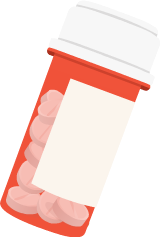Start Tour
presents
End Tour









Treatment Guide: Combination Antiretroviral Medication for HIV


Immune system and blood
HIV destroys CD4+ T cells, a type of blood cell that plays a key role in the immune system.
Different cART drugs work in different ways to stop HIV from multiplying. This lowers the amount of HIV in the blood and increases CD4+ counts. This strengthens the immune system, reducing the risk of HIV complications — including serious and opportunistic infections and some cancers. Reducing HIV in the blood also lowers the risk of transmission.
cART helps prevent Kaposi sarcoma, a type of cancer that can affect skin and other soft tissue in people with HIV. It also lowers the risk of skin infections.
Some people develop a rash after starting cART.
It usually goes away within a few weeks. In rare cases, people may have a severe skin reaction known as Stevens-Johnson syndrome. cART may cause bone density loss. Certain NRTIs and INSTIs sometimes cause muscle damage.
Skin, muscle, and bone
cART helps prevent kidney and liver damage from HIV, but some types of cART can cause kidney or liver damage themselves. The risk of liver damage is increased in people who have both HIV and hepatitis. Doctors order regular blood tests to monitor kidney and liver function in people taking cART.
More common GI side effects of cART include nausea, vomiting, and diarrhea, which often improve within a few weeks.
Gastrointestinal system
Overall, cART appears to lower the risk of HIV-related cardiovascular disease.
But cART can raise blood cholesterol levels, so doctors order regular blood tests to monitor cholesterol in people taking it. Scientists have also linked some cART medications to higher risk of cardiovascular disease. Some types of cART medications raise the risk of heart conduction disorders.
Cardiovascular system
Combination Antiretroviral Medication for HIV
Treatment Guide:

cART lowers the risk of serious neurological complications from HIV, including dementia. Sometimes, it may help improve neurocognitive functions such as attention and memory.
HIV medications may cause nerve damage but
is less common with newer drugs vs. older treatments. Headaches and difficulty sleeping are common side effects of cART that often improve within a few weeks. Certain types of NNRTI and INSTI may cause mood changes.
Nervous system





































